Asian and Global Partners Come Together in Mainstreaming Land Rights in the UN Guiding Principles on Business and Human Rights
QUEZON CITY, Philippines – At the global level, in 2011, the United Nations Human Rights Council unanimously endorsed the UN Guiding Principles on Business and Human Rights (UNGP-BHR/UNGPs), a set of guidelines for States and companies to prevent and address human rights abuses committed in business operations.
2021 marks ten years since the UN Human Rights Council unanimously endorsed the UNGP BHR. While several accomplishments have been achieved since 2011, much is still left to be desired. In particular, civil society organizations have constantly observed that land rights appear as a secondary topic during BHR discussions. The UNGPs thus present an opportunity for land rights advocacies to remain at the center of national and regional policy discussions, especially in a continually globalizing world and the persistence of the land rush in Asia.
Thus, to take stock of gains and anticipate the steps that must be pursued in the coming years, the event entitled Mainstreaming Land Rights in the UNGPs in Asia was conducted from 3 to 4 August 2021. It had two objectives: (1) provide an opportunity for stakeholders to appreciate the relevance of incorporating land rights in the BHR discourse, particularly in the process of UNGP implementation, including development of NAP; and, (2) explore joint actions to promote BHR, land rights, and human rights that may be pursued at the regional level.
The event gathered over 150 participants from civil society organizations, NHRIs/NHRCs, the academe, intergovernmental organizations, private sector, concerned individuals, among other sectors. This workshop is the first regional event of this scale that zoomed in on land rights in the UNGPs, filling an important but sometimes neglected discussion point.
As a result of this workshop, a summary report was be produced by the co-organizers.
Read on for key points and recommendations that emerged from the event.
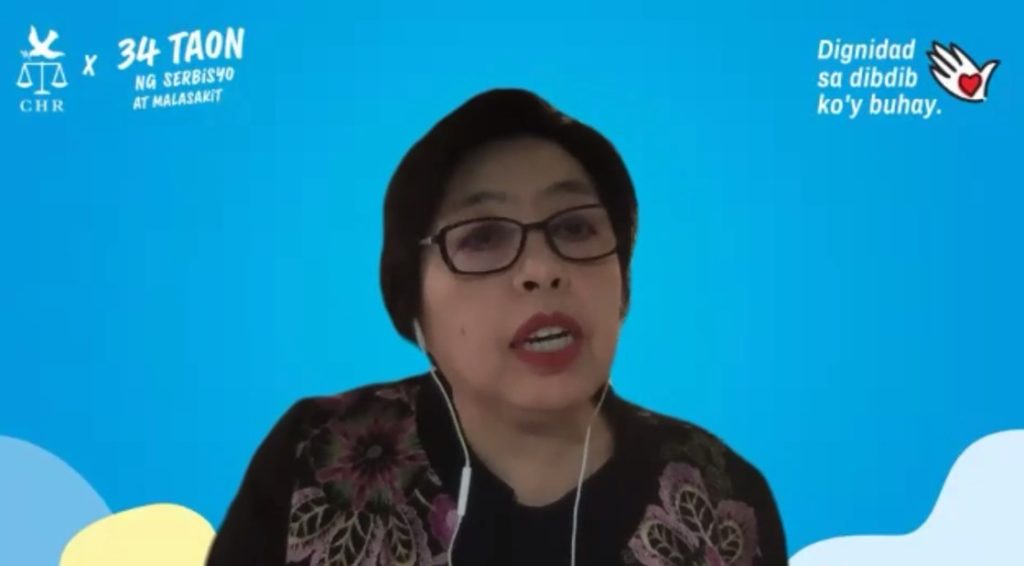
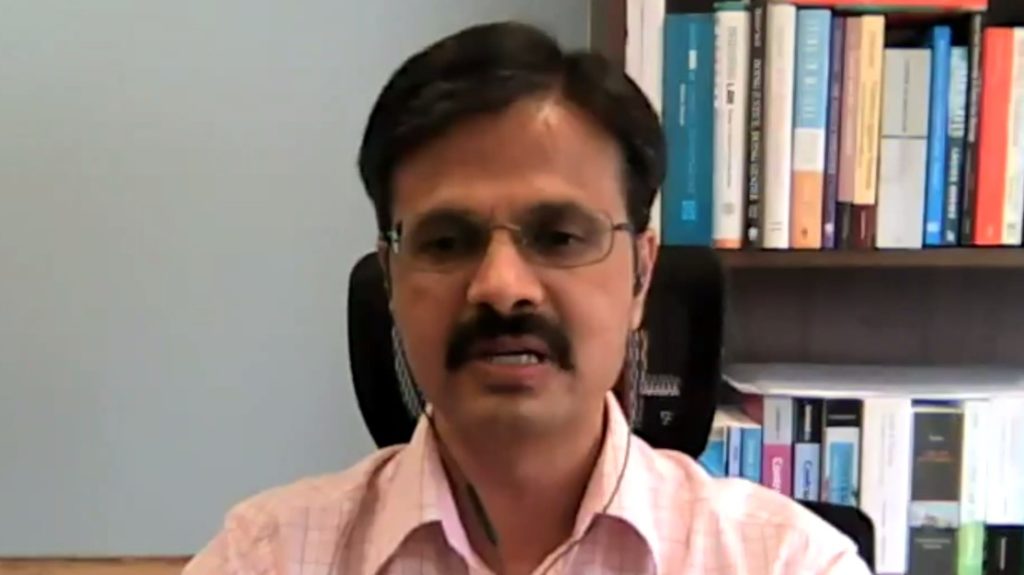
Land Rights are Human Rights
Though there is no independent right to land as recognized by major international conventions, land rights are human rights, noting the deep interrelatedness of land with other human rights. Once use, access, and or control over land is lost, not only is the right to property affected, many other resources, freedoms, and abilities are also impacted. Land rights are also directly linked to rights to livelihood, shelter, culture, identity, among others. As Prof. Surya Deva mentioned, land is unique as a resource, because it can support communities and livelihoods for generations. Land rights being vital to other human rights is also apparent in the way land is crucial in achieving all Sustainable Development Goals.
However, with land being limited and finite, there are also competing interests over it. These competing interests have time and again led to conflict, which have led to violence, loss of life, and deterioration of livelihood. In recent years, the number and intensity of land conflicts have been increasing in number and in intensity.
Many of these conflicts are between communities who depend on land for their sustenance and survival, private corporations who seek to reap profit from land which they see as a commodity, and the government. As Commissioner Gwen Gana notes, while it is true that businesses may positively impact communities and contribute to development, the negative impacts of businesses also undermine human rights. These conflicts with between communities and businesses and/or the government, has resulted in large-scale displacement, landgrabbing, and disregard for free, prior, and informed consent (FPIC).
These unfortunate scenarios were exemplified in the six country case studies on landgrabbing[1] presented by Antonio Quizon. Common themes that were observed include: legal landgrabs, or the role of government in facilitating investments or in transferring high value lands to the private sector without ensuring adequate protection of affected communities; the lack of transparency or peoples’ participation in the land acquisition process; the use of force, fraud, deception, or coercion from governments and private corporations; the circumvention or disregard for protective laws and safeguards; and resistance from communities being painted in a bad light.
Over time, it is observed that States have become more active in brokering land investments. And over time, land is commodified not just as a factor of production, but as a resource whose value will only increase, thus leading to speculation, financialization, and securitization of land. All these are ongoing while policies for secure tenure are underdeveloped or are not being implemented properly.
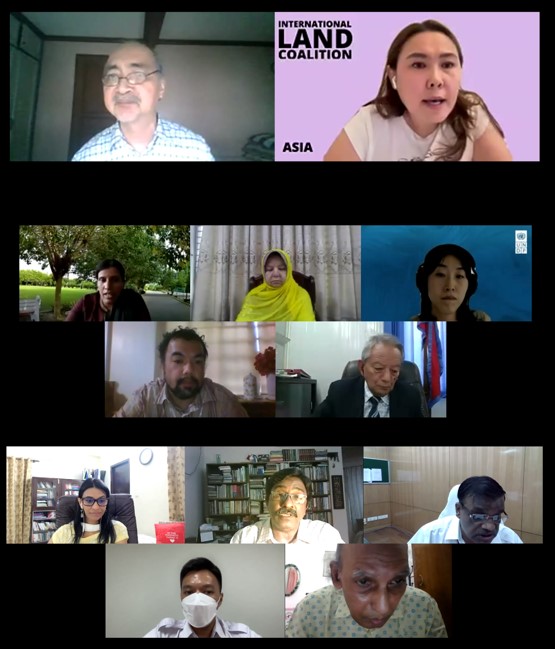
Integrating Land Rights in BHR Processes and NAP Formulation
Among Asian countries, only the governments of Japan and Thailand have published standalone BHR National Action Plans (NAP/s) that detail government’s strategies to implement the UNGPs. South Korea has a human rights action plan which contains a chapter on BHR. Meanwhile, NAPs are being developed by the governments of India, Indonesia, Malaysia, Mongolia, Pakistan, and Vietnam. Within these countries, and in States where NAP development has yet to begin, there are opportunities to ensure that land rights are considered in the NAP.
Among the hindrances to the advancement of NAP-development and BHR implementation, as observed by Geminiano Sandoval in six countries,[2] is the lack of understanding of BHR concepts from governments, civil society, and communities; and while there are many progressive land rights laws, some of them seemingly clash with policies that facilitate land acquisition for business on the other. These observations were also mirrored by panelists from the government and National Human Rights Commissions.
Further, the trend of shrinking democratic space that has restricted free speech and expression has affected civil society’s ability to lobby for the creation of a NAP. The limitations brough on by the COVID-19 pandemic has also impeded the NAP-formulation process in recent times.
The role of NHRI/Cs in implementing the UNGP-BHR is crucial, as these bodies monitor State actions on land rights along with other human rights. NHRI/Cs may also aid the consultation process towards NAP formulation and should monitor NAP implementation. However, in some countries, it’s been observed that the independence and influence of NHRI/Cs are weak, or are undermined by government. There are also countries such as Cambodia, who presently do not have its own independent human rights institution.
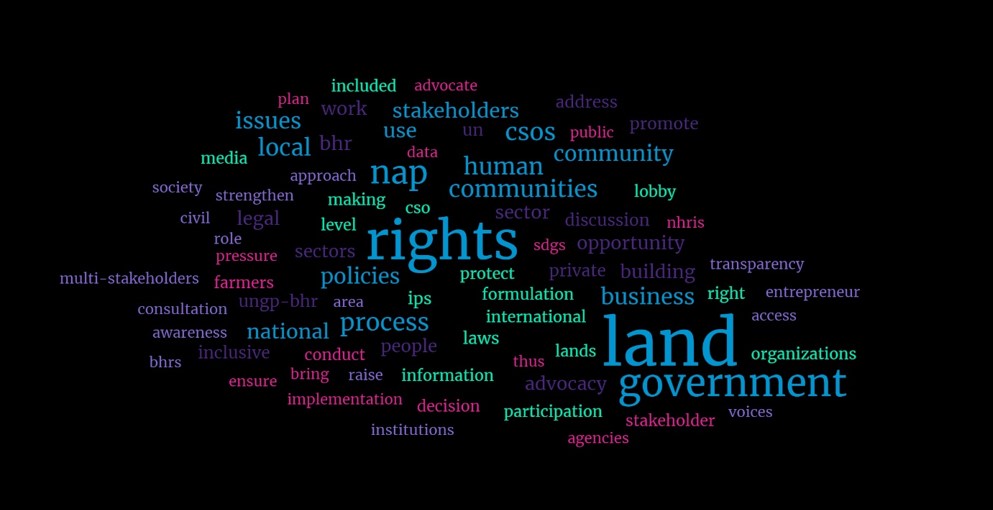
Some key priorities and recommendations
Overall, participants agreed that while land rights are broadly recognized by Asian governments, the present models of development through corporate intervention are unsustainable. However, businesses should not view land rights defenders and CSOs as adversaries. Rather, both camps should be on board towards implementing the UNGPs together. Noting the important role of NHRI/Cs, their capacities must also be strengthened to enable them to function better.
Throughout the forum, speakers and participants shared recommendations on how secure land rights, through integration in and implementation of the UNGP-BHR. These were further discussed during the breakout group discussion followed by a panel reflection session. Among the key priorities raised were the following:
- At the global level, enact a legally binding instrument on BHR to make States more accountable to implement the UNGPs.
- For government
- Prioritize the enactment of NAPs by government, along with an appropriate monitoring mechanism, in close consultation with NHRIs, CSOs, communities. Governments must also be able to consult a wide array of stakeholders towards the enactment and implementation of NAPs.
- Review, reform, and enact policies that strengthen land rights. The UNGPs must also be integrated in these policies. Implement agrarian reforms, FPIC and other safeguards, and enact policies that protect smallholders from unfair or unjust land investments.
- Establish an independent NHRI in Cambodia.
- Focus on resolving land conflicts – create or refine the implementation of case documentation and monitoring, conflict-resolution mechanisms, strengthen local mediation mechanisms, grievance desks, to benefit communities. Establishing land dispute agencies may also be explored to speed up responses to conflicts.
- For businesses
- Include the UNGPs in company policies, in all stages of operation.
- Work with land rights defenders to promote BHR.
- Conduct meaningful, non-deceptive human rights due diligence in cooperation with local communities before starting any project.
- Provide holistic and effective remedies that go beyond monetary compensation.
- For all stakeholders
- Popularize the UNGPs among governments, private sector, businesses, and communities through information campaigns, workshops and trainings, social media and mass media utilization.
- Facilitate partnerships between CSOs, communities, private sector, and the government and expand the network of advocates to pressure governments into formulating people-centered NAPs that include land rights.
This event was jointly organized by ANGOC, the Commission on Human Rights of the Philippines (CHRP), Land Watch Asia (LWA), Asia Working Group on Land Rights as Human Rights (WG LRHR), UNDP Business and Human Rights Asia (B+HR Asia), the Office of the United Nations High Commissioner for Human Rights (UN OHCHR) in Southeast Asia, the Southeast Asia National Human Rights Institution Forum (SEANF), and the International Land Coalition (ILC).
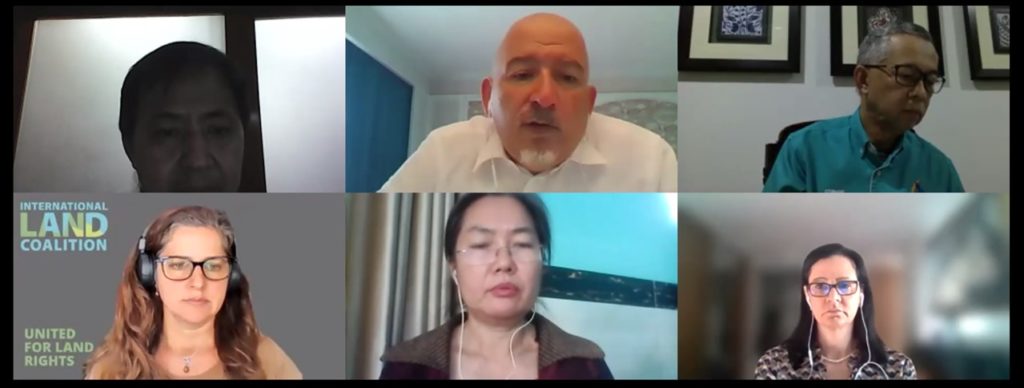
Valuable insights and discussion points were raised by following the session panelists and speakers during the event:
Key resource persons
- Surya Deva, Chairperson, UN Working Group on Business and Human Rights
- Nasima Begum, Chairperson, National Human Rights Commission of Bangladesh
- Top Bahadur Magar, Chairperson, National Human Rights Commission of Nepal
- Bimbadhar Pradhan, Secretary General, National Human Rights Commission of India
- Kamal Uddin Ahmed, Fulltime Member, National Human Rights Commission of Bangladesh
- Garima Dadich, Associate Professor, Indian Institute of Corporate Affairs
- Ibrahim Reza, Head of Section for Bilateral Cooperation on Human Rights, Indonesia Ministry of Law and Human Rights
- Shamsul Huda, Executive Director, Association for Land Reform and Development
- Antonio Quizon, Asian NGO Coalition for Agrarian Reform and Rural Development
- Geminiano Sandoval, Asian NGO Coalition for Agrarian Reform and Rural Development
Messages from
- Gwendolyn Pimentel-Gana, Commissioner, Commission on Human Rights of the Philippines
- Livio Sarandrea, Lead Adviser and Team Leader, UNDP Business and Human Rights Asia
- Othman Hashim, Chairperson, Southeast Asia National Human Rights Institution Forum
- Cristina Timponi Cambiaghi, Senior Thematic and Global Policy Specialist, International Land Coalition
- Chet Charya, Chairperson, Asian NGO Coalition for Agrarian Reform and Rural Development ☐
[1] This presentation features cases from Bangladesh, Cambodia, India, Indonesia, and the Philippines
[2] The presentation summarizes progress, hurdles, and opportunities in implementing the UNGPs in Bangladesh, Cambodia, India, Indonesia, and the Philippines
AAA
